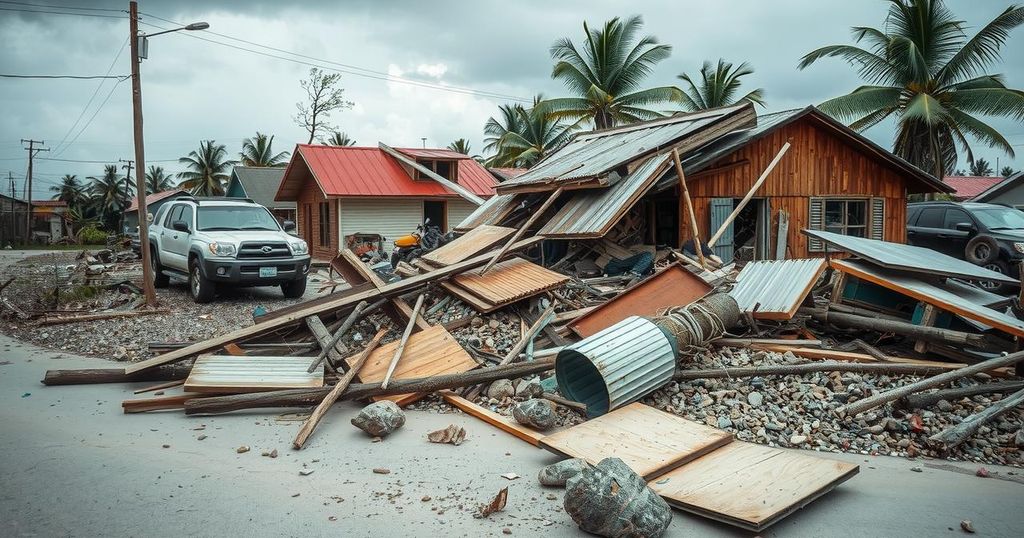World news
AFRICA, CABO DELGADO, CHI, CHIDO, EMERGENCY RESPONSE, EUROPEAN UNION, HURRICANE BERYL, LUISA MEQUE, MAPUTO, ME, MEQUE, MOZAMBICAN, MOZAMBIQUE, NAMPULA, NATIONAL INSTITUTE FOR DISASTER RISK MANAGEMENT AND REDUCTION, NATIONAL INSTITUTE OF RISK AND DISASTER MANAGEMENT, NATURAL DISASTER, NATURAL DISASTERS, NIASSA, RFI, TETE
Stella Nguyen
0 Comments
Cyclone Chido’s Devastation in Mozambique Leaves 34 Dead and Thousands Displaced
Cyclone Chido has resulted in at least 34 fatalities in Mozambique, causing significant destruction and displacing thousands. The cyclone has affected essential infrastructure, with approximately 175,000 people impacted. The storm, downgraded to a severe system, continues to pose risks as it moves towards Zimbabwe, necessitating ongoing humanitarian assistance.
Cyclone Chido has tragically claimed the lives of at least 34 individuals as it ravaged Mozambique, according to the National Institute of Risk and Disaster Management (INGC). The storm made its impact felt primarily in the northern provinces of Nampula and Cabo Delgado, where the initial fatalities were reported. Chido has left thousands homeless and has severely compromised essential infrastructure, including homes and roads.
As the cyclone continues its course through Mozambique, it has been downgraded to a severe storm, yet hazardous conditions remain, including persistent heavy rain and strong winds. Despite its diminished intensity, authorities emphasize the importance of vigilance and preparedness among local communities. INGC President Luisa Meque has appealed for assistance to bolster disaster relief efforts.
The cyclone, which struck earlier this week, produced winds reaching approximately 260 kilometers per hour and delivered over 250 millimeters of rainfall within a 24-hour period. In addition to the fatalities, at least 319 individuals have sustained injuries, while nearly 23,600 homes and around 170 fishing boats have been rendered unusable. The storm has affected approximately 175,000 people in northern Mozambique, a region already susceptible to natural disasters due to ongoing developmental challenges and conflict.
Chido continues to present challenges as it transitions towards Zimbabwe, with heavy rainfall anticipated to cause further complications. UNICEF has reported concerning statistics highlighting the cyclone’s impact on children, noting that an estimated 650,000 children and their families are at risk. The organization has underscored the ongoing humanitarian crisis, emphasizing the potential for families to be separated and lack access to basic necessities, including water, medical care, and education.
The scale of devastation suggests that Cyclone Chido may be one of the worst storms to hit Mozambique in the past decade, following its passage through the Indian Ocean island of Mayotte, where losses are feared to be in the hundreds.
Mozambique is prone to cyclones due to its geographical location in Southern Africa, regularly experiencing severe weather patterns exacerbated by climate change. Cyclone Chido’s recent landfall has highlighted the risks faced by vulnerable populations in the region, where infrastructure is often inadequate. With conflicts and underdevelopment compounding the challenges, the country’s disaster management systems are under significant strain as they attempt to respond to the ongoing crises. The importance of international aid and local preparedness is crucial in mitigating the impacts of such disasters.
Cyclone Chido’s passage through Mozambique has led to a significant humanitarian disaster, claiming lives and displacing thousands. The ongoing impact of the cyclone underscores the need for coordinated relief efforts and community preparedness. With authorities calling for aid, the situation remains critical as the affected regions work to recover from this devastating weather phenomenon while contending with the inherent vulnerabilities linked to historical and socio-economic factors.
Original Source: www.rfi.fr




Post Comment